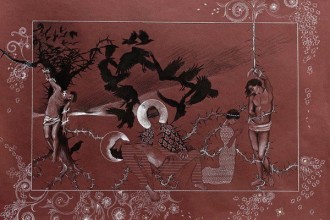Reality was once as simple and manageable as a bicycle frame. Today “reality†is an antiquated word. Who can conceive of it — who can look at it? It is beyond our reach. It circles around us, we hear its signals, but not one of us comprehends them. Reality has become unreal. It is as if the scientists have abolished it in order to bring back blind faith. But politicians, the responsible ones, the world over negotiate and bargain with reality as if it still were something they could understand. And meanwhile it grows over our heads like an irresponsible chain reaction.
The world and reality have changed. When the first atomic bomb was produced, Einstein remarked that now we need a change of consciousness, if mankind is going to survive. He had the imagination to break with previous schools of thought, broke through the shell of what, until then, had been our reality. He had a first glimpse of what lay beyond, and brought that message back — that now everything was different, that now among the general population a break from previous trains of thought was necessary — a change of consciousness, if humanity was going to survive.
We would hardly call him starry-eyed and naive, would we?
But what has become of this general change of consciousness? We could search for it for a long time.
We search for it while those in power undertake actions that at first glance don’t appear obvious given the situation. What are these strange things they are letting in for us? Letting them in without ceremony, without lit candles, or without the chance to reflect. Just the window discretely ajar for a moment and then closed again. And there we stand and something new has entered the room, something fateful or malodorous or both, something that makes everything more uncomfortable. But within a few days we get used to it. It gets forgotten, blends into the routine.
And furthermore their actions are carried out with the best of intentions. We are sure of this. Really. It is done as a continuation of the still ongoing, far-reaching attempt to secure for humanity freedom from fear.
The problem is just the method… it’s been tried before. It’s old hat. And so far it has worked counter to its aim.
Due to the fears we harbour in ourselves, we create fear for others, which creates more fear for ourselves, endlessly compounding.
And the bombs grow in number and size and can keep growing and growing. And more or less authorized masqueraders hold preparedness speeches for us. Everything isn’t as bad as you think. If an atomic bomb is dropped, just tip over a table and lay down, so the table top comes between you and the bomb.
Another vicious circle. We continue to use circular logic in a world that has become four-dimensional. Only in one sense does it give the result that can lead to freedom from fear: if there is no one left to feel it.
But if by freedom from fear we mean the possibility to live in security, then it gets difficult fast. A change in consciousness is still needed. I think Einstein was right. And it is not only necessary that others change, that our opponents change, we also have to change ourselves.
And we must realize that however unfamiliar, however new, however risky it may feel, that while enmity breeds only enmity and mistrust breeds only mistrust, that trust — the most elementary, innate human form of reconciliation — is the only thing that can create trust. And that it can be done.
Knud Sønderby (1909-1966) was an eminent Danish novelist, journalist , translator and essayist. Sønderby wrote as a journalist for three major Danish newspapers while publishing five novels, six plays, and translating numerous works into Danish for the Royal Theater. This essay is drawn from one of his six essay collections. Sønderby was a founding member of the Danish Academy.
Michael Goldman taught himself Danish over 25 years ago to help him win the heart of a lovely Danish girl—and they have been married ever since. Since leaving his career as a remodeling contractor two years ago, his translations have appeared in 16 literary journals. He is also a jazz clarinetist. Michael Goldman lives in Florence, Mass.
‘The Window Ajar’ first appeared in Danish as ‘Vinduet pÃ¥ klem’ in Knud Sønderby’s final collection of essays, ‘De blÃ¥ Glimt’ (1964).




